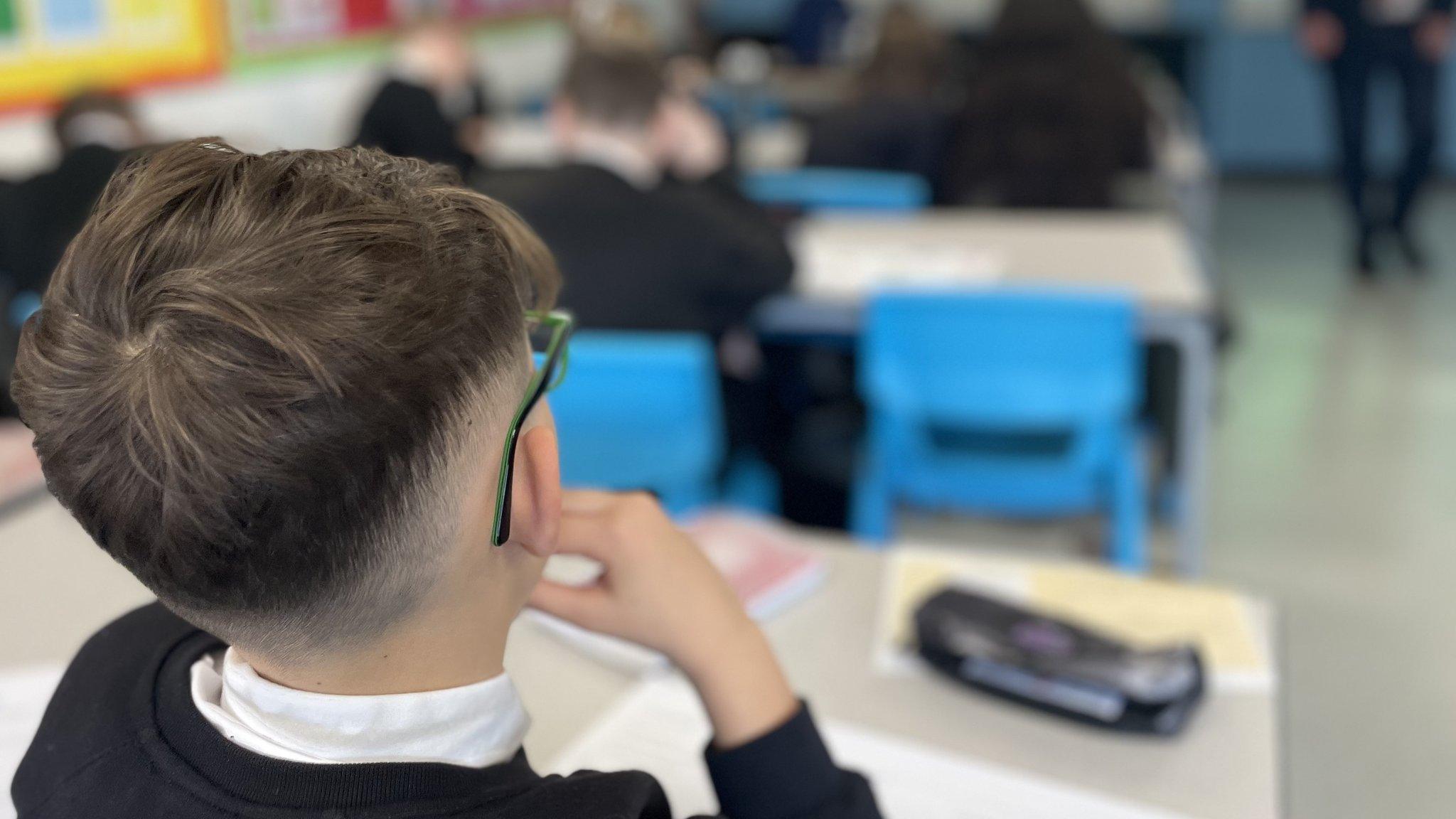What are new education minister's priorities?
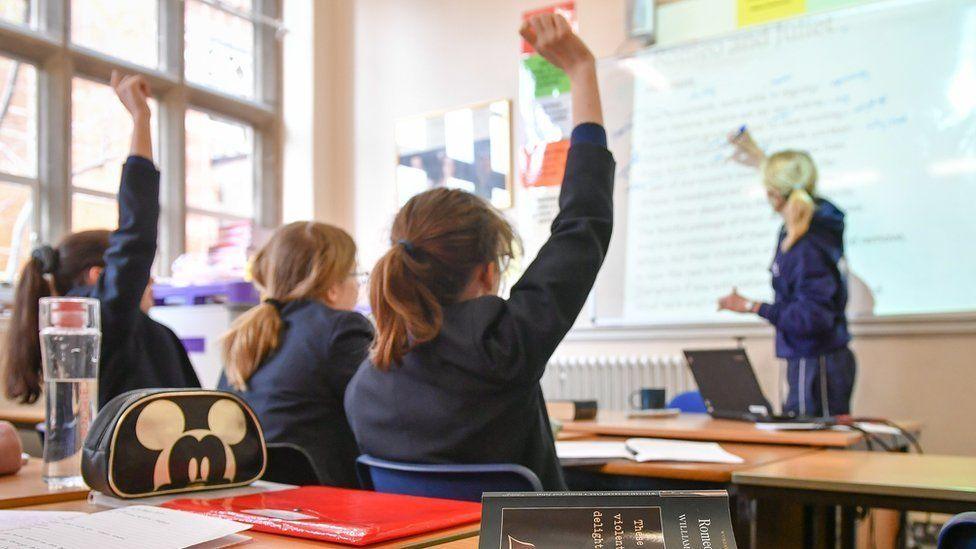
- Published
"How hard is your job?"
That was the question put to Wales' new cabinet secretary for education by one of the pupils she met while on a visit to a Cardiff primary school.
"I'll be honest with you, it's quite hard because I'm new," was Lynne Neagle's unguarded response.
It is the first cabinet position for Ms Neagle, who is one of only four politicians remaining in the Senedd from the very first election 25 years ago.
She is due to set out her vision for education in Wales on Tuesday, with one of her top priorities being tackling absenteeism and bad behaviour in Welsh schools.
School summer holidays could be cut by one week
- Published21 November 2023
Wales' new first minister announces his cabinet
- Published21 March 2024
Teachers face 'abuse'
The percentage of secondary school pupils missing 10% of school sessions has rocketed since Covid, more than doubling between 2018-19 and 2022-23 to 40%.
Instances of verbal and physical abuse towards staff have also become more common, unions say.
Neil Butler, national officer for Wales at teaching union NASUWT, said: "We have a situation now where more than ever, the NASUWT is in dispute with schools across Wales over the failure of the employer to protect our members from - verbal abuse mainly - but occasionally physical assault as well."
The union is calling for the Welsh government to hold a summit to discuss the issue.
Mr Butler said abuse directed at classroom staff was "a daily occurrence and has almost become part of the culture".
Ms Neagle told Members of the Senedd on Wednesday that the Welsh government was working on a "behaviour toolkit".
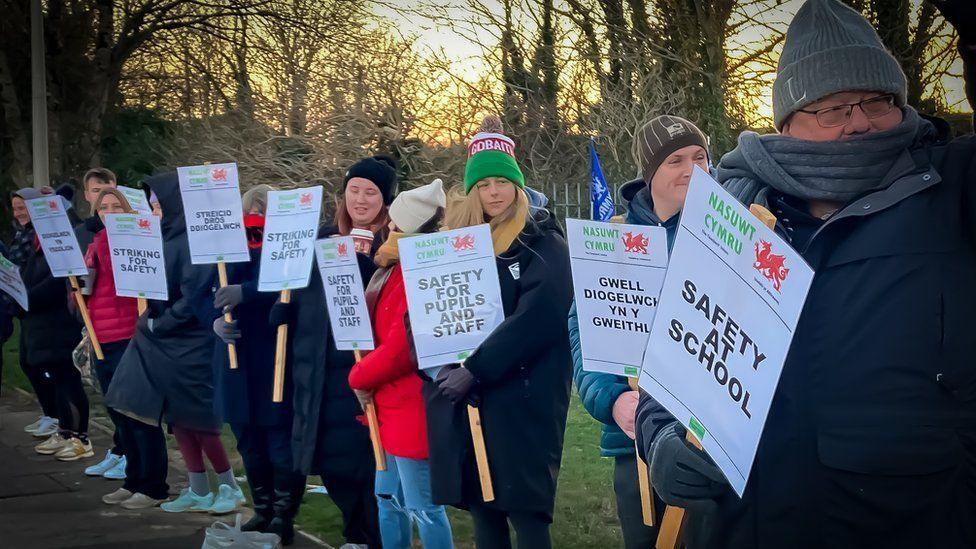
Teachers on a picket line holding signs about school safety in the Vale of Glamorgan in January
Education results
Another key challenge for Ms Neagle will be to raise standards after Wales recorded its worst scores in latest internationally-recognised Pisa tests.
The first post-Covid results also saw Wales falling further behind the other UK nations in reading, maths and science.
Dr Luke Sibieta, from the Institute for Fiscal Studies, said: "Undoubtedly Welsh education ministers, over the last 25 years have been focused on improving education results.
"The problem is that we just haven't seen the improved outcomes and we've seen wider inequalities as well.
"So I think there's a need for a pause and a consultation with teachers to work out what the best way is, to actually change direction in policy and in practice, to really actually improve standards rather than assuming the next policy is going to be the next big thing."
Senedd member Tom Giffard, the Welsh Conservative's education spokesperson, said Ms Neagle had the "opportunity to undo the damage of her predecessors" when it came to Pisa results, but had not done so.
"Under Labour in Wales our children will continue to come last on every measurable data point," he said.
International students sleeping rough on campuses
- Published9 May 2024
School stabbings prompt safety review across Wales
- Published3 May 2024
Fears pupils prefer processed food to school meals
- Published12 April 2024
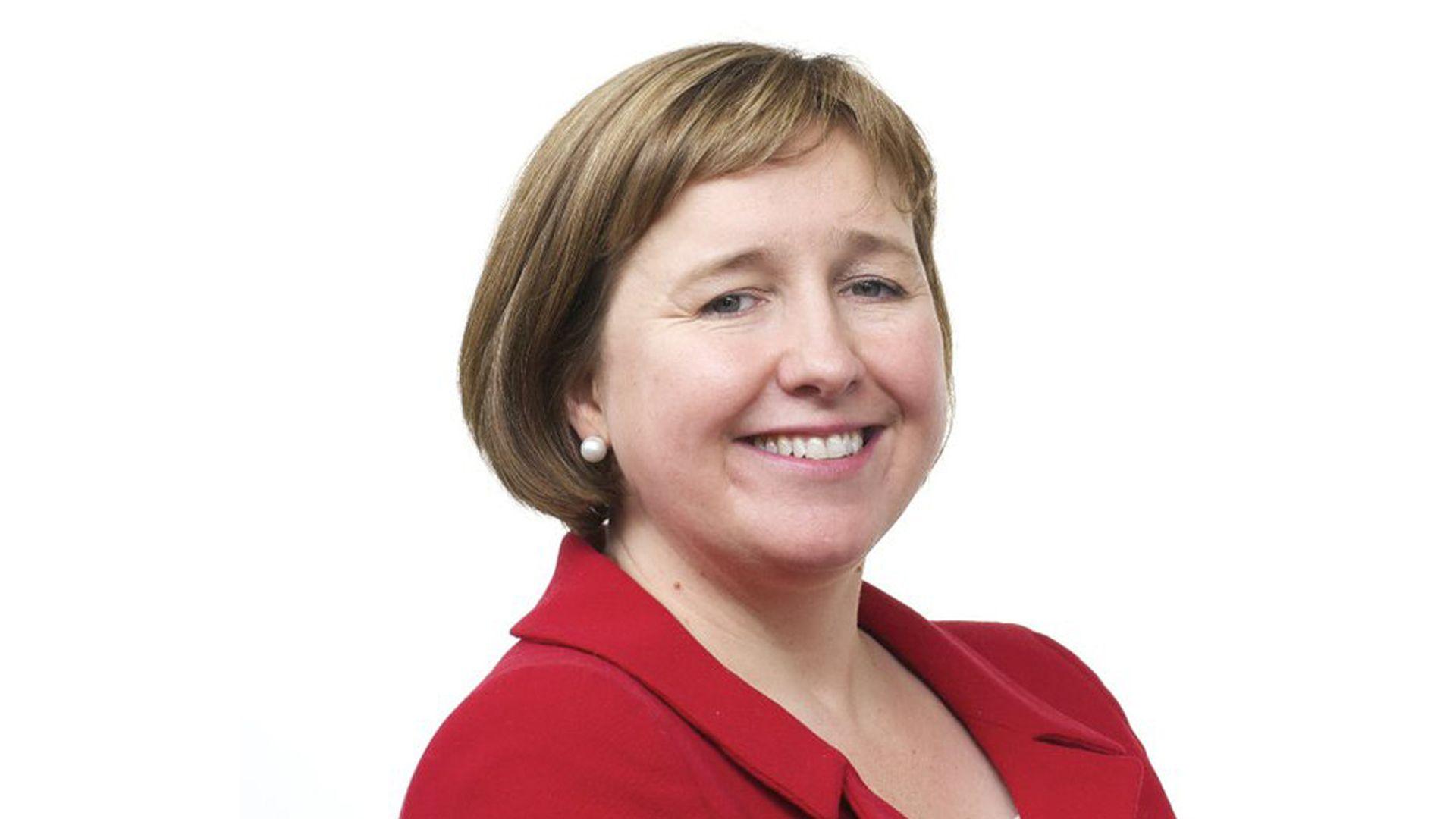
Lynne Neagle is the new cabinet secretary for education
Are school holidays changing?
One policy that was developed by Lynne Neagle's predecessor, Jeremy Miles, was to reform the school year by cutting the summer holidays.
It will be up to Ms Neagle to decide whether the controversial plans should go ahead.
Dr Sibieta said the proposals were "unlikely to have much effect at all on inequalities and performance" and he called on the Welsh government to focus on helping schools get to grips with the new curriculum.
Dr Gareth Evans, from University of Wales Trinity St David, said there was a "general feeling within the system that there is too much going on and we need to consider what we carry on with and what we're better off dropping".
"A new minister often brings an element of disruption, but I think this is a good opportunity to have another look at what we're doing," he said.
Ms Neagle told WalesOnline, external that reform of the school year was "not a fait accompli" and that she was listening to the responses to the government's consultation.
'Many schools struggling' financially
Many within the sector have raised concerns about the financial pressures schools are facing.
"Many schools are struggling and having to decrease the workforce at a time when we need more people going into the profession," said Plaid Cymru's education spokeswoman Heledd Fychan.
"The cuts aren't sustainable.
"We had a survey last year published by the unions showing that 75% of the teaching profession we're considering leaving.
"If this isn't a crisis, then what is it?"
Ms Neagle told the Senedd she recognised it was a "really challenging situation" but that the government had "prioritised" funding for schools.
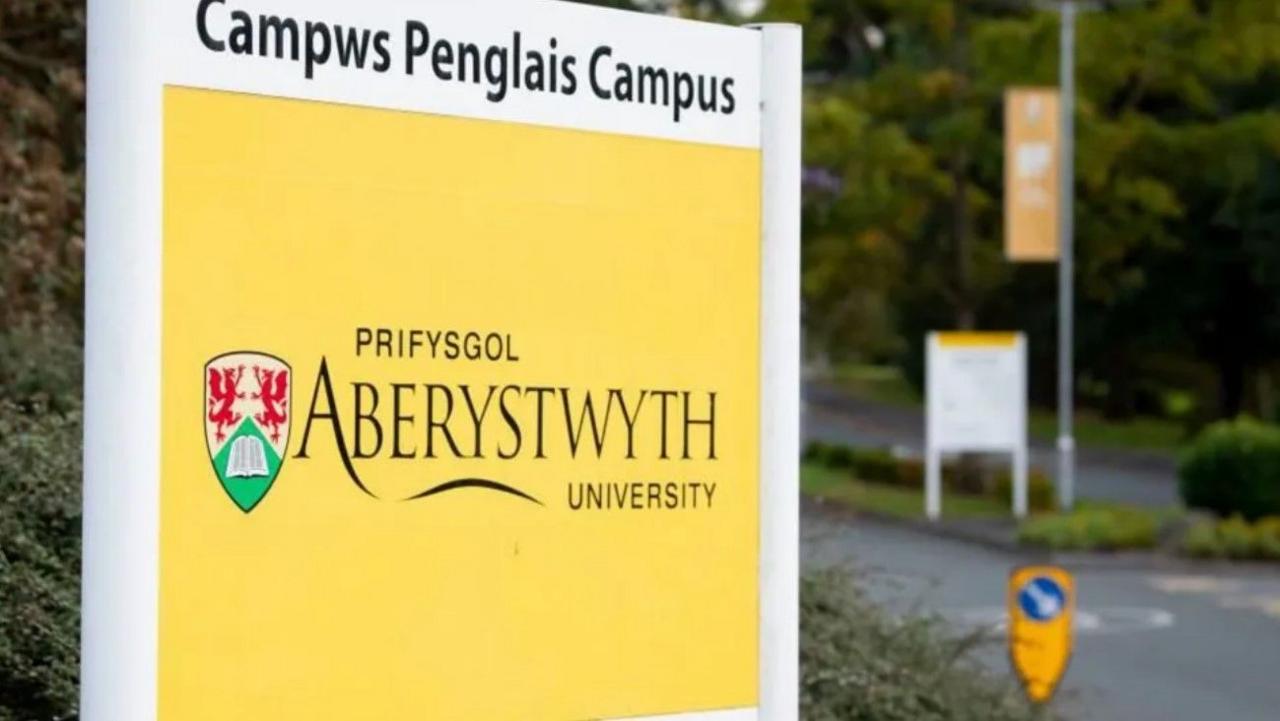
There's a warning up to 200 jobs could go at Aberystwyth University
University jobs threatened
Higher education funding is another challenge with many Welsh universities expressing concern about their financial position.
And there is a warning that up to 200 jobs could go at Aberystwyth University.
"The financial position for our sector, and we fully understand for many other sectors at the moment, is rather difficult," said Prof Paul Boyle, Vice Chancellor of Swansea University and chairman of Universities Wales.
"It's probably about the most pressing time I've seen in higher education in Wales and in the UK as a whole."
He explained that another concern for Welsh universities was the "widening" gap between the number of Welsh students applying to university and the rest of the UK.
"If students in Wales were participating or applying to university at the same rate as the rest of the UK we would expect about an extra 5,000 students to be coming forward."
The Welsh government said it recognised "the financial pressure on higher education institutions".
More from BBC Politics Wales on BBC1 Wales on Sunday at 10.00 BST and on the iPlayer
Related topics
Related Stories
- Published28 March 2024

- Published31 March 2024
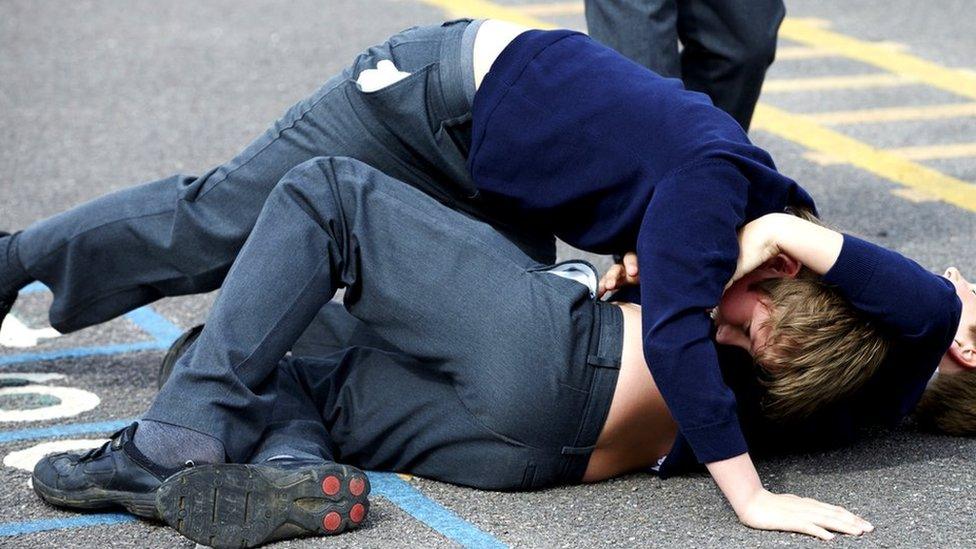
- Published5 December 2023
